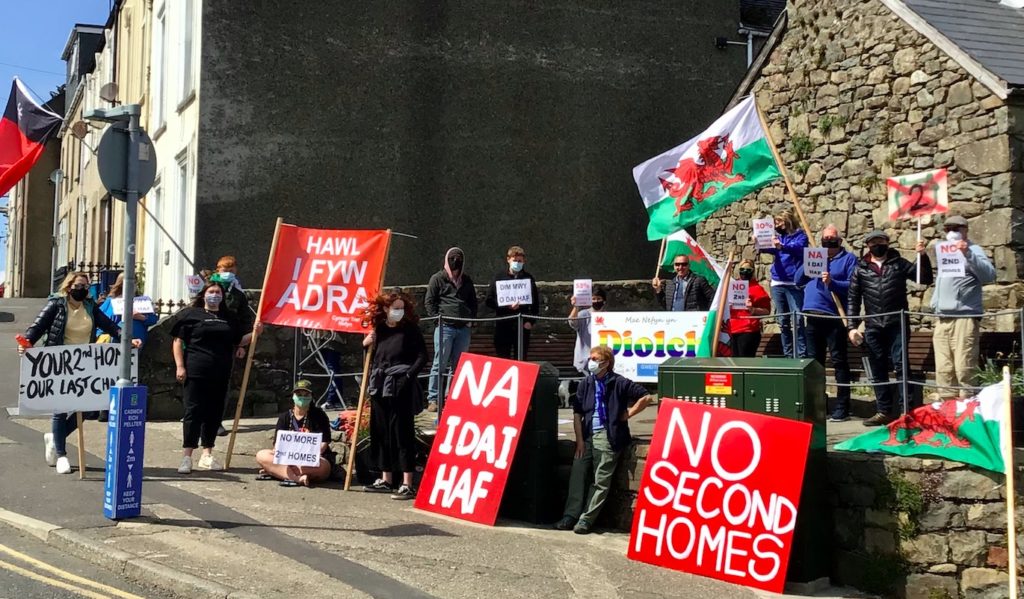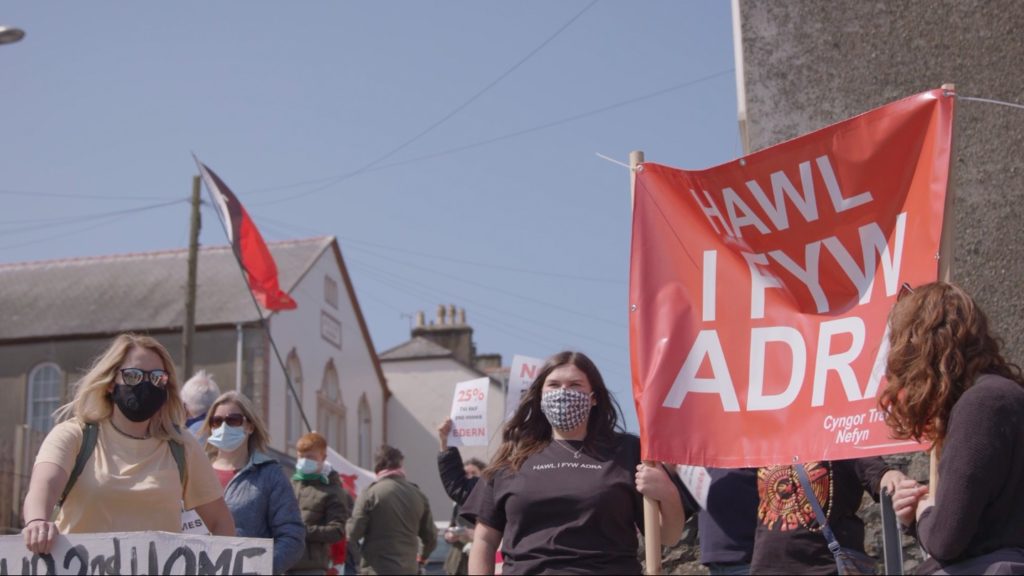Parties challenged to tackle second homes crisis days before Wales hits polls

Gareth Williams, local democracy reporter
Wales’ political parties have been challenged on what they would do in the face of a second homes “crisis” engulfing many Welsh speaking heartlands.
Just days before the nation goes to the polls, campaigners turned out in Nefyn and urged decision makers to tackle the issue head on.
In an effort to keep the issue fresh in the minds of politicians, the move was prompted by a letter from the town council to all Wales’ parties seeking their commitment to addressing the issue early into the next Senedd term.
Communities in Gwynedd and across much of west Wales have long urged action amid skyrocketing house prices, at least partially prompted by Wales’ popularity as a second home destination.
According to Gwynedd housing chiefs, 40% of properties sold in the county during 2019/20 were holiday homes or buy-to-lets, with ongoing concerns that efforts to stem their popularity and to try fund more affordable homes – including a 100% tax premium – are too easy to circumnavigate.
The letter sent on behalf of Nefyn Town Council, which cites an “emergency” in rural and coastal Wales, says: “It is not uncommon to see a £100,000 discrepency in the price of a house in our area compared to a similar one elsewhere in the county.
“The increase in house prices is responsible for uprooting local residents from their own communities and is leading to a decline of the Welsh language.”
Noting that the Nefyn Town Council area has around 30% of its stock designated as second homes – a percentage they claim is growing – members claim there will no longer be a vibrant community left unless parties act.
They also note disappointment that no parties have signalled they will carry out the 12 policy recommendations made by Dr Simon Brooks in a Welsh Government commissioned report on second homes.
The letter goes on to state: “There’s a need to prioritise people who are trying to buy their only home and live in it full time over people seeking their second home to live in it occasionally.”
‘Parties aren’t taking this seriously’
Part of Saturday’s demonstration in the centre of Nefyn was Cllr Rhys Tudur, an active member of the local ‘Hawl i Fyw Adra’ campaign.

He told the Local Democracy Reporting Service: “This is to show our concern that the parties aren’t taking the housing emergency seriously.
“In my view none of them have made a clear commitment they will do something of note if elected and that’s concerning, as our community is facing unprecedented pressure.
“There are simply too many holiday homes here, over 30% in Morfa Nefyn, and there won’t be a community left unless controls are brought in as soon as possible.”
Cllr Gruffydd Williams, the local county councillor for Nefyn, added: “So many homes have been turned into Air BnB’s or are being snapped up by people from outside of the area, the prices have just skyrocketed.
“There’s no chance for most locals even finding the deposit needed but I sincerely hope that any new government makes changes to the planning system and makes it possible to control the numbers of holiday lets and second homes just to give local people a fair oppoprtunity to stay in their own communities.”
What the parties say
As part of its manifesto pledges, Welsh Labour says it will retain the 1% increase in Land Transaction Tax charged on second home purchases.
The party also says it will build 20,000 new, low carbon social homes for rent, adding: “We will work with communities to explore and develop effective tax, planning and housing measures – which could include local rates of Land Transaction Tax -to ensure the interests of local people are protected.”
The Welsh Conservatives, meanwhile, make no specific point in regards to second homes but pledge an “ambitious target” of building 100,000 homes over the next 10 years,” whilst ensuring “enough affordable housing in our local communities,” including 40,000 social homes.
Promising to restore the Right-to-Buy, the party also says it would reinvest sale proceeds into more social housing and protect homes from sale for 10 years, while also cutting Land Transaction Tax (Stamp Duty) to help more families get onto the housing ladder by raising the purchase price threshold to £250,000 and scrapping it for first time buyers.
The Plaid Cymru manifesto notes that the “mounting problem” of second homes has been “cruelly exposed during the Covid-19 pandemic” but promises to build 30,000 council houses, 5,000 cost-rental homes at intermediate rent and 15,000 affordable homes to buy.
Claiming that the “overuse of properties as second homes” is creating “desolate, half-empty towns and villages in winter,” the party pledges to change planning laws and allow councils to impose a cap on their number as well as refusing permission to change a dwelling from being a primary to a secondary residence.
Among other pledges are to double the permitted tax premium from 100% to 200% and “close the loophole” allowing their registration as businesses, trebling the Land Transaction Tax charge on second properties and “empower councils to build houses with a local conditions requirement,” making it easier to bring empty properties back into use to “redefine the term affordable home.“
Second homes are also referred to in the Welsh Liberal Democrats’ manifesto, pledging to “ensure that the right houses are built in the right places in order to meet local needs.”
Stressing that people in rural communities have been “priced out or left with scarce housing,” the party promises to legislate on requiring local authorities to set council tax at “the maximum possible level for all homes other than someone’s primary residence.”
Also promising to “close loopholes” on the transferring from domestic to business rates, the party also wants to build “more connected, quality homes.”
Other parties referring to second homes include Propel, who promise to “close the second homes loophole,” whereby second homes are reclassified as businesses to avoid local taxation, and set compulsory targets for local authorities to bring long-term empty properties back into use.
Gwlad, meanwhile, says it would “actively discourage” second homes or holiday lets by introducing a licensing scheme similar to that which currently applies to HMOs (Houses in Multiple Occupation).
Any application for a new licence or the renewal of a licence would “automatically be refused if the number of similarly licensed premises in the Ward exceeds 5% of the total housing stock,” with any awarded a licence subject to a 500% council tax premium.
Llais Gwynedd, which is contesting the Dwyfor Meirionnydd constituency, say they will campaign for planning laws that “reflect the need for affordable homes for local people, who should be given priority in housing.”
The party also notes that “legal loopholes” that allow holiday home owners to register their properties as a business “to avoid paying council tax, must be rectified.”
Support our Nation today
For the price of a cup of coffee a month you can help us create an independent, not-for-profit, national news service for the people of Wales, by the people of Wales.






I hope they also tackle the problem of non-affordable homes for sale and rent. I live in Colwyn Bay (which is hardly the Monte Carlo of Wales!) and even here house prices and rents are very high. This means they are well beyond the reach of local young people. Any new build so-called ‘affordable’ homes are snapped up by ‘investors’ and the insatiable ‘buy-to-let’ market and then rented out for extortionate rents or flipped. The cheapest decent apartments are often only available to retired people, which is very cruel and discriminates against the young. I hope the next Welsh Government… Read more »
Various countries in Europe have strong regulations on non-residents buying second homes. It’s saved Denmark’s beautiful coastline from wealthy German ownership, for example. There are examples to be looked at. Wales needs to confidently define its own (very good) reasons for setting up stronger regulations and not capitulate to free-market bullying.
Very well said Ms Roberts.
It’s encouraging that the housing crisis in the Bro Gymraeg has become an election issue, even though little mention has been made of it by Labour, and virtually none by the Tories. Whoever wins on Thursday, there will be a big expectation on them to fix this.